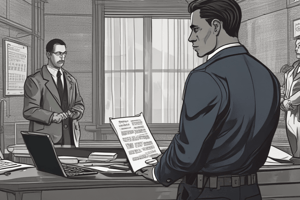Podcast
Questions and Answers
What does the Court say regarding the requirement for Miranda warnings during routine traffic stops?
What does the Court say regarding the requirement for Miranda warnings during routine traffic stops?
- Miranda warnings are necessary even for questioning related to minor infractions.
- Miranda warnings are required once a traffic stop leads to an arrest.
- Miranda warnings are always required during traffic stops.
- Miranda warnings are not required during routine traffic stops. (correct)
In which case did the Court clarify that the questioning during a routine traffic stop does not constitute custodial interrogation?
In which case did the Court clarify that the questioning during a routine traffic stop does not constitute custodial interrogation?
- Florida v. Bostick
- Berkemer v. McCarty (correct)
- Pennsylvania v. Bruder
- Miranda v. Arizona
What aspect of traffic stops did the Court emphasize when determining they are not custodial interrogations?
What aspect of traffic stops did the Court emphasize when determining they are not custodial interrogations?
- Traffic stops automatically lead to formal arrests.
- Traffic stops are lengthy interactions.
- Traffic stops are typically held in private settings.
- Traffic stops are generally public and less coercive. (correct)
When are Miranda warnings necessary according to the Court?
When are Miranda warnings necessary according to the Court?
What does the purpose of Miranda warnings primarily protect against?
What does the purpose of Miranda warnings primarily protect against?
Which factor does NOT indicate a suspect is in custody?
Which factor does NOT indicate a suspect is in custody?
Which of the following statements about Bruder's case is accurate?
Which of the following statements about Bruder's case is accurate?
Which of the following best describes the nature of routine traffic stops according to the Court?
Which of the following best describes the nature of routine traffic stops according to the Court?
In which scenario are Miranda warnings NOT required?
In which scenario are Miranda warnings NOT required?
What is a key takeaway from Berkemer v. McCarty (1984)?
What is a key takeaway from Berkemer v. McCarty (1984)?
How does the Court distinguish the context of traffic stops from more formal police custody?
How does the Court distinguish the context of traffic stops from more formal police custody?
When does interrogation occur according to the provided content?
When does interrogation occur according to the provided content?
Which statement is true regarding the continuation of questioning after invoking the right to counsel?
Which statement is true regarding the continuation of questioning after invoking the right to counsel?
What atmosphere leads to a requirement for Miranda warnings?
What atmosphere leads to a requirement for Miranda warnings?
Which of the following does NOT constitute an exception for requiring Miranda warnings?
Which of the following does NOT constitute an exception for requiring Miranda warnings?
When must police provide Miranda warnings?
When must police provide Miranda warnings?
What does the Sixth Amendment right to counsel protect against?
What does the Sixth Amendment right to counsel protect against?
Under what conditions does the Fifth Amendment protect individuals from self-incrimination?
Under what conditions does the Fifth Amendment protect individuals from self-incrimination?
How does a subsequent Miranda warning affect earlier Sixth Amendment violations?
How does a subsequent Miranda warning affect earlier Sixth Amendment violations?
When is a suspect considered 'in custody'?
When is a suspect considered 'in custody'?
What is required before custodial interrogation can begin?
What is required before custodial interrogation can begin?
Which statement about confessions obtained post-indictment is true?
Which statement about confessions obtained post-indictment is true?
What distinguishes the application of the Sixth Amendment from the Fifth Amendment during interrogations?
What distinguishes the application of the Sixth Amendment from the Fifth Amendment during interrogations?
Which of these statements about admissions made without an attorney is true?
Which of these statements about admissions made without an attorney is true?
What is the primary requirement for laws that limit fundamental rights?
What is the primary requirement for laws that limit fundamental rights?
What landmark case recognized the right to privacy under substantive due process?
What landmark case recognized the right to privacy under substantive due process?
In Brady v. Maryland, what evidence was withheld by the prosecution?
In Brady v. Maryland, what evidence was withheld by the prosecution?
What does the Brady Rule require from prosecutors?
What does the Brady Rule require from prosecutors?
How are testimonial self-incrimination and nontestimonial self-incrimination different?
How are testimonial self-incrimination and nontestimonial self-incrimination different?
What was the central issue in Davis v. Washington?
What was the central issue in Davis v. Washington?
What fundamental rights are protected under substantive due process?
What fundamental rights are protected under substantive due process?
Which statement regarding due process rights in relation to evidence disclosure is true?
Which statement regarding due process rights in relation to evidence disclosure is true?
What type of statements made during an emergency are considered non-testimonial?
What type of statements made during an emergency are considered non-testimonial?
In the Davis v. Washington case, what was the primary reason the Court deemed the 911 call admissible?
In the Davis v. Washington case, what was the primary reason the Court deemed the 911 call admissible?
Which amendment protects defendants from being forced to testify?
Which amendment protects defendants from being forced to testify?
What is the purpose of juror sequestration during a trial?
What is the purpose of juror sequestration during a trial?
What does the term 'change of venue' refer to in the context of a trial?
What does the term 'change of venue' refer to in the context of a trial?
Which right allows witnesses to refuse to testify if it may incriminate them?
Which right allows witnesses to refuse to testify if it may incriminate them?
What is a common method to protect a defendant's right to a fair trial against prejudicial publicity?
What is a common method to protect a defendant's right to a fair trial against prejudicial publicity?
Which of the following statements correctly defines testimonial statements in legal terms?
Which of the following statements correctly defines testimonial statements in legal terms?
Study Notes
Miranda Warnings & Traffic Stops
- Miranda warnings are not required during routine traffic stops.
- Traffic stops are temporary and brief interactions, similar to a Terry stop, which is non-custodial.
- The atmosphere is public and less coercive than formal police custody.
- Miranda applies after formal arrest.
Pennsylvania v. Bruder
- Bruder was stopped for suspected drunk driving.
- The police questioned Bruder about drinking and asked him to perform field sobriety tests.
- Bruder made incriminating statements.
- No Miranda warnings were given.
- The Court held routine roadside questioning during a traffic stop does not constitute "custodial interrogation".
- A traffic stop is a brief detention not an arrest.
- The police environment during a traffic stop is not inherently coercive.
Distinguishing Miranda from the Right to Counsel
- Miranda rights: focus primarily on protecting the Fifth Amendment right against self-incrimination during police interrogations.
- Sixth Amendment Right to Counsel: guarantees the right to legal representation during "critical stages" of prosecution after formal charges are filed.
When Is a Suspect in Custody?
- A suspect is considered in custody when they are formally arrested or when they are deprived of freedom in a significant way.
- Custodial interrogation: interrogation that takes place while a suspect is in custody.
Factors Considered When Determining if a Person is in Custody:
- Location of questioning
- Duration of questioning
- Presence of law enforcement
- Whether a reasonable person would feel free to leave
Questioning at the Police Station:
- Requires Miranda warnings due to the coercive atmosphere.
- Exceptions:
- If the suspect goes to the station on their own and knows they are free to leave.
- If the suspect goes to the station upon invitation of the police but is told they are not under arrest and free to leave.
Questioning in a Police Car:
- Requires Miranda warnings even if the suspect hasn't been placed under arrest.
Questioning a Person in Custody for Another Offense:
- Requires Miranda warnings.
When Is a Suspect Under Interrogation?
- Interrogation: when the police ask questions that tend to incriminate or create the functional equivalent of an interrogation.
- Functional equivalent: any actions or words by the police that they should know are reasonably likely to elicit an incriminating response.
Non-Interrogation Scenarios:
- Voluntary statements made by the suspect.
- Routine booking questions.
Situations That Require Miranda Warnings
- Custodial interrogation: the core requirement for Miranda warnings—the suspect must be both in custody and subject to interrogation.
- Scenarios requiring warnings:
- Police station questioning after arrest.
- Traffic stop escalating into a custodial situation.
- Interrogations in jail, even if unrelated to the crime of incarceration.
Exceptions to Miranda
- Public safety exceptions.
- Spontaneous statements.
- Questions asked during routine processing.
Edwards v. Arizona
- Edwards was arrested and informed of his Miranda rights.
- Edwards initially waived his rights and talked to the police, then requested an attorney.
- The police stopped questioning him.
- The next morning, different officers resumed questioning Edwards without his attorney present.
- Edwards was again advised of his Miranda rights and confessed to the crime.
Issue:
- Can police reinitiate questioning after a suspect has invoked their right to counsel?
Key Points:
- Edwards's right to counsel was violated.
- The police cannot resume questioning after a suspect requests an attorney.
- Any confession obtained after the request for counsel is inadmissible.
Substantive Due Process
- Protects fundamental rights.
- Examples:
- Privacy, free speech, marriage, family life.
- Laws that limit these rights must serve a compelling state interest and must be narrowly tailored.
- Courts review these laws to ensure that they do not infringe on fundamental liberties without justification.
The Brady Rule on Disclosure of Evidence
- Case: Brady v.Maryland
- Requirement: Prosecutors must disclose evidence that is favorable to the defense if it is material to guilt or punishment.
- Violation: Failure to disclose such evidence violates the defendant’s due process rights.
Brady v. Maryland
- Brady and a companion were charged with first-degree murder.
- Both defendants admitted to participating in the crime, but each blamed the other for the killing.
- Brady's defense requested that the prosecution turn over all statements made by the companion.
- The prosecution provided some statements, but withheld one in which the companion confessed to the murder.
- Brady was convicted and sentenced to death.
- The Supreme Court held that the prosecution’s suppression of evidence favorable to the accused upon request violates due process when the evidence is material to guilt or to punishment.
Testimonial vs. Nontestimonial Self-Incrimination
-
Testimonial self-incrimination: statements or admissions made by the defendant that can be used as evidence in court.
-
Nontestimonial self-incrimination: physical evidence, such as fingerprints, blood samples, or DNA, which is not protected by the Fifth Amendment.
-
The Fifth Amendment protects against being compelled to testify against oneself, but not against providing physical evidence.
Davis v. Washington
- Davis assaulted his ex-girlfriend.
- She called 911 during the altercation.
- The victim provided real-time information about the attack.
- Davis was charged with domestic violence based on the 911 call, as the victim did not testify at trial.
- The Court held that the 911 call did not violate the Confrontation Clause because the statements were not "testimonial."
- Statements made during an ongoing emergency are considered non-testimonial and therefore not subject to the Confrontation Clause.
Statements made during an emergency
- Do not require the declarant to appear in court for cross-examination.
Privileges During Trial for the Accused
- Right Against Self-Incrimination: Fifth Amendment protects defendants from being forced to testify.
- Right to Remain Silent: Cannot be used against the defendant in court.
- Double Jeopardy Protection: Defendants cannot be tried twice for the same offense.
Privileges During Trial for Witnesses
- Witness Immunity: Witnesses can be granted immunity from prosecution to compel testimony.
- Right Against Self-Incrimination: Witnesses can invoke the Fifth Amendment to avoid incriminating themselves.
- Privilege Against Testifying: In some cases, like spousal privilege, certain witnesses may be exempt from testifying.
The Right to a Fair and Impartial Trial
- Controlling Prejudicial Publicity:
- Media coverage can influence public opinion and juror impartiality.
- Courts have methods to protect the right to a fair trial.
Methods to Control Prejudicial Publicity
- Change of Venue: Moving a trial to a different location to ensure an unbiased jury.
- Sequestration: Isolating jurors from the public and media during the trial to prevent exposure to outside influence.
- Continuance: Delaying the trial to allow public attention and media coverage to subside.
Studying That Suits You
Use AI to generate personalized quizzes and flashcards to suit your learning preferences.
Related Documents
Description
Test your knowledge on the application of Miranda warnings during traffic stops and the legal implications of Pennsylvania v. Bruder. This quiz delves into the distinctions between custodial interrogation and brief detentions in traffic situations. Understand the nuances of the Fifth Amendment rights in the context of routine police interactions.





